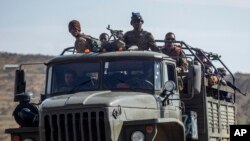Fighting has escalated in northern Ethiopia with the federal government vowing to seize airports in the Tigray region following the postponement of peace talks with Tigray People's Liberation Front (TPLF) rebels.
The government in a statement Monday said that while it was "committed to the peaceful resolution of the conflict" it would take "immediate control of all airports, other federal facilities, and installations" in Tigray.
Responding to the government's statement, TPLF spokesman Getachew Reda told AFP: "It's a clear indication that the government and its ally will do everything to carry through their genocidal intent against the people of Tigray."
African Union-led peace talks slated earlier this month in South Africa fell through with logistical challenges blamed for the postponement. AU Commission chair Moussa Faki Mahamat called for an "immediate, unconditional ceasefire" Sunday.
A date for negotiations is yet to be announced in Africa's second most populous nation.
Kelvin Karanja, Nairobi-based governance, peace and conflict analyst told VOA that the postponement of the peace talks have ''ripple effects'' not only for Ethiopia but across the East African sub-region.
"Had the mediation taken place with a deal reached, Ethiopian refugees in Sudan will return home, but right now they continue to suffer on the other side of Sudan. There's increasing exodus of people from Ethiopia due to perceived fear, persecution and discrimination by the federal government," he said.
The U.N. humanitarian office says 20 million Ethiopians need humanitarian assistance. Millions of people in the northern regions of Tigray, Amhara and Afar have been displaced due to the conflict.
Karanja said he hopes to see a "sustainable agreement that spells out the role of regional powers in national elections" and urged the AU to "consult widely and fast so these talks can kickstart and to help ease the burden of the conflict on the Ethiopian population."
Among outstanding challenges, both sides have disagreed over who should be involved in mediation efforts.
"The Tigray government has objected to the role of the AU envoy (former Nigerian president Olusegun Obasanjo), but it's not clear what his role will be, vis a vis that of former Kenyan President Uhuru Kenyatta and former South African Deputy President Phumzile Milambo-Ngcuka," said William Davison, senior analyst at the International Crisis Group (ICG) for Ethiopia.
Obasanjo and Kenyatta did not respond to VOA requests for comment.
The ICG's senior analyst told VOA that the current circumstances ''are incredibly difficult with conflict still ongoing on multiple fronts, largely inside and to some extent outside the Tigray region.''
However, Davison said that an uptick in the level of contact between the warring parties is a positive signal.
"The most promising thing is that we've seen an increase in the level of engagements from various international actors, including the African Union, but also the U.S. government, the European Union and the United Nations for example. Despite the resumption of fighting that's thought to have killed tens of thousands of people, just from August 24th, we've seen continued contact between the federal government and Tigray government representatives," he said adding that "those are small bright spots."
The Tigray People's Liberation Front (TPLF) consider themselves the elected government of the Tigray region, and have been fighting the federal government which classified the TPLF as a terrorist organization.
The dispute over the TPLF's legitimacy and its strike on an army base — what the regional government called an act of self-defense — in 2020 sparked the war in Tigray, a region inhabited by 7 million people.
Each side has blamed the other for violating a March cease-fire after fighting resumed in Tigray in August.
Rights groups accuse both sides of committing widespread human rights violations.
Some of the information in this report came from Agence France-Presse.







